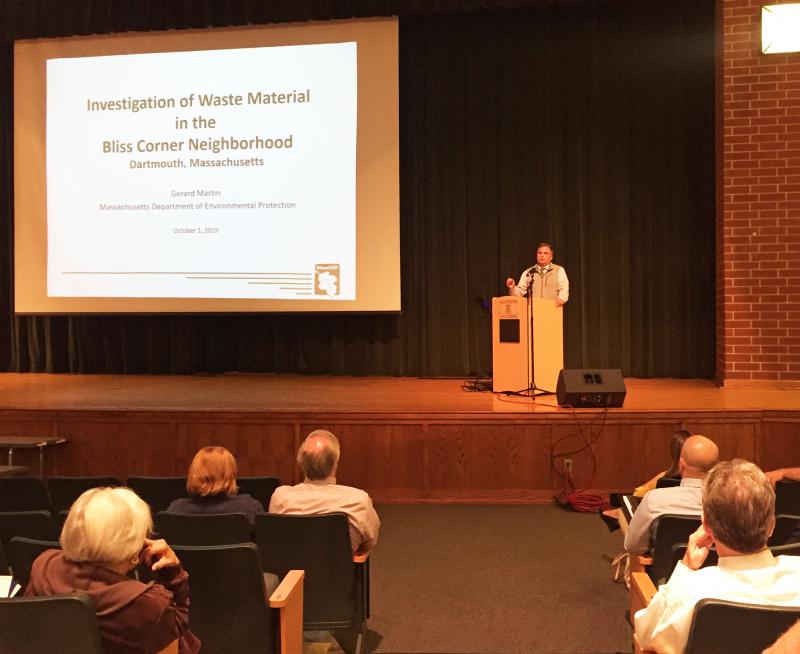More PCBs, lead found in Bliss Corner
High levels of contaminants have been found in residential soil in the Bliss Corner neighborhood after a third round of testing, a representative from the state’s Department of Environmental Protection told residents at a public meeting on Tuesday evening.
Samples were taken at fifteen residential properties in a new round of testing after dangerously high levels of contaminants — including polycyclic aromatic hydrocarbons (PAHs), polychlorinated biphenyls (PCBs), and lead — were found at 85 McCabe Street and 20 Kraseman Street during construction activity earlier this year.
The new samples show polychlorinated biphenyls, or PCBs, on an adjacent Kraseman Street property at a level deemed a potential “imminent hazard” by the state of Massachusetts.
High levels of lead were also found on a number of properties in the neighborhood.
Deputy Regional Director for the Bureau of Waste Site Cleanup Gerard Martin told residents that the DEP has covered the spot where high levels of PCBs were found, and advised them to avoid contact with and growing food in contaminated soil.
He also urged them to sign up to get their soil tested, as the extent of the pollution problem is still largely unknown.
However, Martin stressed that only a small percentage of properties tested thus far were affected. “I was afraid we’d see more PCBs,” he noted before his presentation, adding that the lead levels were consistent with human activity in urban areas.
Earlier rounds of testing showed no issues with volatile compounds or groundwater contamination, and only a few samples taken on town streets showed contaminant levels exceeding safety standards.
But Martin said that more work needed to be done to determine the full extent of the problem.
The DEP plans to partner with the federal Environmental Protection Agency to conduct field tests in a more efficient way.
The agency has also filed two requests for information with the Town of Dartmouth to try to find whoever was responsible for the historic dumping. According to Martin, they are still digging through all of the documents provided.
Although turnout at the meeting was much lower than at the first public meeting on the issue in March — around 80 people came to the Dartmouth High auditorium on Tuesday, compared with 250 at the previous meeting — residents managed to make their voices heard.
Many were concerned with property prices, taxes, and who would bear the ultimate burden for the cleanup.
“My tax is going up and up, but my property value is less and less,” said one frustrated man at the back of the room.
“My true goal is to minimize any damage to these properties and the people involved,” said State Representative Chris Markey, who led the meeting.
Other residents expressed frustration that the process has taken several months already.
“I’m a little disappointed that since March, only fifteen properties have been tested,” said Curtis Nunes, who added that he owned one of them.
Nunes also noted that residents should have been mailed information about the meeting. “I don’t think the word’s getting out,” he said. “If I didn’t happen to go on Facebook yesterday, I wouldn’t be here tonight. And I think that’s why this turnout is so low.”
But some residents thought the meeting went pretty well.
“I thought it was more productive than the last one,” said Gil Perry, whose aunt lives in the neighborhood. “But I still think there were a lot of unanswered questions.”
New neighborhood resident Derek Botelho is considering getting his property tested. “I bought the house, and I put $75,000 into it within a year. So I’m a little bit concerned,” he said.
Sharp Street resident Bella Pereira said afterwards that the meeting was “okay,” but she was still “upset” with the town.
“I’ve lived there since 1974,” Pereira added. “I lost my husband to cancer. We used to plant vegetables. I’m very upset about this.”
Town Administrator Shawn MacInnes noted during the meeting that the town was working very hard to provide DEP with everything it needed, and that notices about the meeting were broadcast on the town’s cable network, posted to the website, and sent out on social media.
“This problem hit our town like a bomb,” said Select Board member David Tatelbaum. “It’s a situation that we’re responsible for and we need to take care of it.”
Board member Stanley Mickelson seemed optimistic, saying that the meeting went “very well.”
“From the day I found out about this, I was sick to my stomach,” he said, noting that the problem is “a hundred years old.”
“But it seems to me that they’ve got it covered,” he added.













